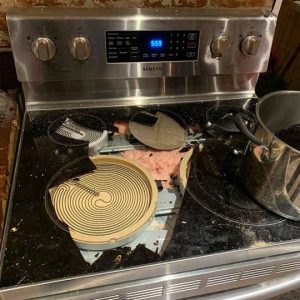Glass top stoves bring a sleek, modern look to any kitchen. Their flat, smooth surfaces are easy to clean and give a polished, minimalist appeal. But despite their stylish appearance, these stoves come with a unique set of risks that many homeowners overlook. One common mistake could lead to a shattered cooktop, turning your kitchen’s centerpiece into a costly hazard.
The Appeal and Risks of Glass Top Stoves
Glass top stoves have become popular for their streamlined design and ease of maintenance. Unlike traditional coil burners, these stoves have no crevices for crumbs and spills, making cleanup a breeze. However, while tempered glass tops are durable, they are not immune to damage, especially under specific conditions that create hidden risks.
Why Hot Lids Can Cause Your Glass Top Stove to Shatter
One of the most dangerous yet common mistakes people make is placing a hot lid facedown on the glass cooktop. At first glance, it seems harmless, but this simple action can create a vacuum seal between the hot lid and the glass surface. Here’s why it’s problematic:
- Vacuum Seal Formation: When a hot lid is placed directly on the glass, the heat becomes trapped between the lid and the cooktop. This creates a vacuum seal, causing the lid to stick tightly to the glass.
- Pressure Buildup and Cracking: As the cooktop cools, trapped heat creates a pressure difference that can cause the glass to crack. Cracks typically form in a spiderweb pattern, compromising both the appearance and structural integrity of the cooktop.
The Dangers of a Cracked Glass Top Stove
A cracked glass top stove isn’t just a visual blemish; it’s a safety hazard. Here’s why you should avoid cooking on a cracked glass top:
- Safety Risks: A cracked surface can shatter under heat or pressure, sending glass shards flying and posing a serious risk of burns or injuries.
- Heating Problems: Cracks can interfere with the stove’s heating elements, leading to uneven cooking or even electrical short-circuits that could result in fires.
How to Protect Your Glass Top Stove
Taking preventive steps can save you from costly repairs and potential injuries. Here’s how to keep your glass top stove safe:
- Avoid the Hot Lid Trap: Place hot lids on a heat-resistant trivet or a cool, flat surface instead of directly on the cooktop. This simple adjustment can prevent a costly mishap.
- Use Compatible Cookware: Choose pots and pans with flat, smooth bottoms to avoid scratching the glass. Handle heavy cookware like cast iron with care to prevent accidental drops.
- Clean Regularly: Keep your stove clean by wiping it down after each use. Even small particles can cause scratches if trapped under cookware, which can weaken the glass over time.
What to Do If You Notice a Crack
If you spot a crack on your glass top stove, stop using it immediately. Cooking on a cracked surface increases the risk of a complete shatter, which can be dangerous. Here’s what to do next:
- Assess the Damage: Depending on the severity of the crack, you may be able to repair it. Small cracks might be fixable, but larger ones usually require a full replacement of the glass top. Contact a professional to evaluate the damage.
- Repair or Replace: For minor cracks, repairs may be possible. However, deep or extensive cracks often mean it’s time to replace the cooktop. A professional technician can advise on the best course of action.
Final Thoughts: Keep Your Glass Top Stove Safe
Glass top stoves are a stylish and functional addition to any kitchen, but they do require mindful handling to avoid damage. By understanding the risks of placing a hot lid on the cooktop and following simple preventive steps, you can enjoy your glass top stove for years to come. So, next time you’re cooking, remember these tips to keep your kitchen both safe and beautiful.






